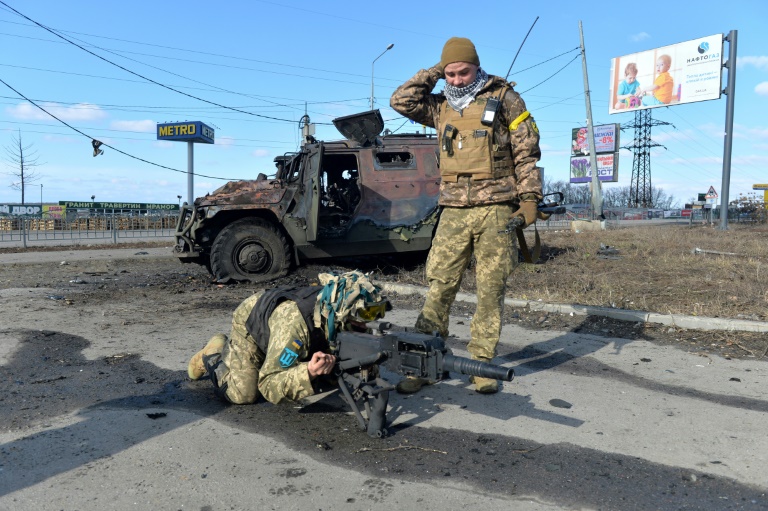Russia and Ukraine were preparing Monday for their first talks since Moscow’s invasion, as fighting raged and Western-led sanctions started to bite with the ruble collapsing.
Ukraine said Sunday it had agreed to send a delegation to meet Russian representatives on the border with Belarus, which would be the foes’ first public contact since war erupted.
Belarus announced Monday that the venue for the talks had been prepared and they would start as soon as the delegations arrived.
However, with his government reporting hundreds of civilian deaths and Russian troops besieging key cities, Ukrainian President Volodymyr Zelensky said he was sceptical about the talks.
“As always: I do not really believe in the outcome of this meeting, but let them try,” he said.
Russia invaded on Thursday and quickly announced it had neutralised key military facilities, but fierce fighting has since raged and Ukraine forces are reporting some success.
“The Russian occupiers have reduced the pace of the offensive,” the general staff of the Ukraine armed forces said.
The United States has also said that Ukraine forces, backed by Western arms, are stymieing the advance of Russian troops.
Putin on Sunday ordered Russia’s nuclear forces onto high alert in response to what he called “unfriendly” steps by the West. Russia has the world’s largest arsenal of nuclear weapons and a huge cache of ballistic missiles.
The United States, the world’s second largest nuclear power, slammed Putin’s order as “totally unacceptable”.
Germany said Putin’s nuclear order was because his offensive had “halted” and was not going to plan.
– Economic pressure –
The campaign by the United States and its allies to build economic pressure on Russia also showed more signs on Monday of having an impact.
Russia’s central bank announced Monday it was more than doubling its key interest rate to 20 percent because the Russian economy’s situation had “drastically changed”.
The value of the ruble also continued to collapse against the dollar and the euro on the Moscow Stock Exchange on Monday.
And the European Central Bank warned Monday that the European subsidiary of the Russian state-owned Sberbank was facing bankruptcy.
The Kremlin has brushed off sanctions, including those targeting Putin personally, as a sign of Western impotence.
Among the sanctions, the West has said it would remove some Russian banks from the SWIFT bank messaging system, and freeze central bank assets.
The United States and its allies are seeking to continue building the diplomatic and military pressure, as well as economic.
EU member states closed their airspace to Russian planes and many pledged arms for Ukraine — but stressed they would not themselves intervene militarily.
Brussels announced it would provide 450 million euros ($500 million) for Ukraine to buy weapons and ban Russian central bank transactions, as well as restricting two Moscow-run media outlets.
British energy giant BP also said Sunday it was pulling its 19.75-percent stake in Rosneft, a blow to Russia’s key oil and gas sector, which is partly reliant on Western technology.
The White House said it would hold a secure call with allies and partners Monday to discuss “developments” in Russia’s attack on Ukraine and “coordinate our united response”.
The UN General Assembly will hold a rare emergency session Monday to discuss the conflict.
Also in response to hostilities, FIFA ordered Russia to play its home international fixtures in neutral venues and warned it was considering banning it from the 2022 World Cup.
– Defending cities –
On day four of an invasion that stunned the world, Ukrainian forces said Sunday they had defeated a Russian incursion into Ukraine’s second city Kharkiv, 500 kilometres (310 miles) east of Kyiv.
Ukrainian officials said they were fighting off Russian forces in several other areas, and claimed that 4,300 Russian troops had been killed.
The Ukrainian army said Monday morning that Russian forces had “several times” attempted to storm the outskirts of Kyiv overnight, but all attacks were repelled.
“The situation in the capital of our homeland is under control,” said the army on Facebook.
Local media reported strong explosions heard throughout Sunday night in both Kyiv and Kharkiv.
Presidential advisor Oleksiy Arestovich said on Telegram early Monday the capital had been targeted overnight by three Russian missile strikes, one of which was intercepted.
The southern city of Berdiansk is now occupied by Russian soldiers, he added.
Ukraine has reported 352 civilian deaths, including 14 children, since the invasion began. Russia has acknowledged that a number of its forces had been killed or injured.
– ‘Humanitarian crisis’ –
The United Nations has put the civilian toll at 64 while the EU said more than seven million people could be displaced by the conflict.
“We are witnessing what could become the largest humanitarian crisis on our European continent in many, many years,” the EU commissioner for crisis management Janez Lenarcic said.
Ukraine has called on its own civilians to fight Russia, with a brewery in Lviv in the country’s west switching its production line from beers to bombs, making Molotov cocktails for the volunteer fighters.
At the Medyka border crossing with Poland, volunteer Jasinska said the long line of arrivals, mostly women and children, need warm clothes.
Crossing Medyka with his family, Ajmal Rahmani, an Afghan who fled Afghanistan for Ukraine four months before the US withdrawal, told AFP: “I run from one war, come to another country and another war starts. Very bad luck”.
Putin has said Russia’s actions are justified because it is defending Moscow-backed separatists in eastern Ukraine.
The rebels have been fighting Ukrainian government forces for eight years in a conflict that has killed more than 14,000 people.
burs-kma/jfx










